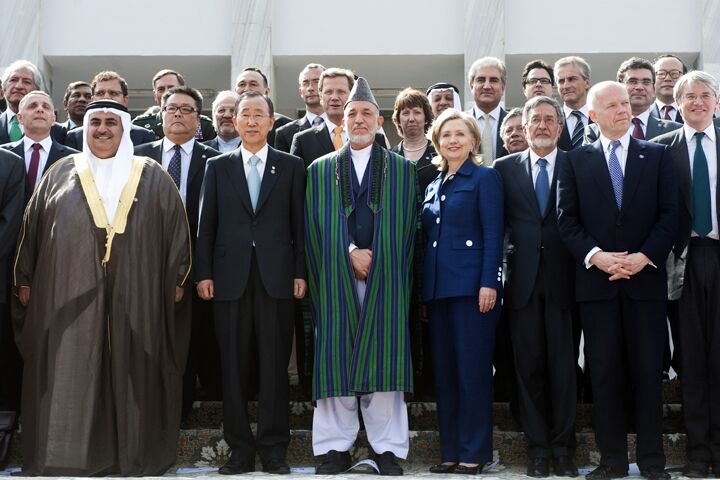
Afghanistan—to Stay or Not to Stay
The British ought to have known better than to get involved in Afghanistan from their own past history in that country. Russia’s failed Afghanistan experience certainly taught them the lesson that the Americans and their allies in the Afghanistan conflict have all had to learn the hard way. You never win in Afghanistan!
U.S. Secretary of State Hillary Clinton voiced the obvious at the Kabul conference when she declared, “Citizens of many nations represented here, including my own, wonder whether success is even possible—and if so, whether we all have the commitment to achieve it.”
Thus it was that a gathering of national representatives in Afghanistan’s capital gave the impression, almost to a man, that they were all weary of the loss of life, the destruction of property, the huge expense, the corruption of the Karzai government, the general untrustworthy nature of the locals that all make up the sad equation of the Afghan war.
Those assembled ostensibly did so in what the Economist termed, “The hope … that this might prove to the world that, nine years after the international community descended on the pile of rubble made by 30 years of war, Afghanistan’s government is on the way towards being able to look after itself” (July 20).
Some hope. Some vain hope!
History will prove the utter worthlessness of such a hope as nations progressively withdraw their support of America in this futile war. It is inevitable. The very nature of the Afghan people, the nature of their enemies, the war weary mindset of their “protectors,” all will work to guarantee the grand failure of much that the West has sought to implement in Afghanistan.
One of the key factors that will work to further entrench instability in Afghanistan will be the impending withdrawal of the U.S.-led coalition in another war—Iraq. Nothing appears to have changed in the Obama administration’s stated policy to have all U.S. combat troops out of Iraq by the end of 2011. A few months ago the New York Times noted the conundrum that President Obama faces on this question: “The situation presents a test for Mr. Obama’s vow to end the war, perhaps the most defining promise he made when he ran for president. While Mr. Obama has proved flexible about other campaign promises and deadlines, his plan to pull out combat forces by August and the remaining 50,000 trainers and advisers by December 2011 has been the most inviolate of policies” (April 27).
So “flexible” has the American president been on so many of his campaign promises that if he dares to become “flexible” on the Iraq withdrawal it could excessively exacerbate his already rapidly declining support from the American electorate. For this reason we doubt that the president will publicize any change in this policy till the fall election results are in.
Either way, Iran, the Wahhabi Saudi underwriters of terror and the Taliban insurgents all read the writing on the wall. The U.S. may have the military hardware to blow them all sky high, but both the public and the president lack the spine to use that power to vanquish terror from the Middle East and from further threatening incursions into the Anglo-Saxon nations.
But what they are beginning to witness, and will increasingly fear, is the assertiveness and determination of Germany’s minister of defense, Karl-Theodor zu Guttenberg. Those terror mongers that have any capacity for logic and any access to reliable intelligence must clearly see that Germany’s defense minister is embracing the very same strategy that led to phenomenally successful results against Germany’s declared enemies in the early stages of World War ii. The military elites in Germany are gearing for blitzkrieg, and their first victim will be the upstart extremists of Iran.
Guttenberg is clearly steamrolling ahead with a total revamp of the structure of the Bundeswehr. He is intent on upgrading its officer cadre to the very best of professional status, its supportive military industry to a consolidated Europe-wide well-oiled machine, its equipment, logistics, communications and military intelligence plus its space-age surveillance capacity to cutting-edge state-of-the-art. In the process, Guttenberg is carefully underwriting a change in mood within the German electorate to the point where it will embrace the concept of active military involvement globally. If you want proof of all this, just check theTrumpet.com archive. This is a situation the Trumpet has been monitoring closely since Guttenberg was handed his portfolio of choice by Chancellor Merkel last October. He’s been on a roll ever since.
Germany has a long-term relationship with Afghanistan, dating back to the interwar years of the 1920s. German elites recognized very early, once the internal combustion engine became the motor behind industry and the military, that securing Afghanistan was key to control of the eastern flank of the Middle East oil triangle. Other nations may tire of the battle and withdraw from Afghanistan; Germany won’t!
Reflecting on the Kabul conference, one of the sharpest sources of German intelligence observed that Germany this month has “forged ahead with plans providing for the withdrawal of most troops while launching precision attacks against insurgents. At the Hindu Kush, ‘wish dreams’ must be overcome, declared Karl-Theodor zu Guttenberg. To counter ‘terrorist elements’ effectively, an ‘international coordination of the deployment of intelligence services and special forces’ should be initiated. nato’s General Secretary Anders Fogh Rasmussen pleads in a similar direction. He told the German press that Afghanistan would also need nato’s ‘permanent aid’ even if nato units ‘change to a supportive function.’ ‘Permanent aid,’ de facto, would mean permanent intervention” (German-Foreign-Policy.com, July 20).
Watch Afghanistan and watch Germany. The two will form an integral part of the equation in the dramatic fulfillment of the prophecy of Iran’s downfall and the consolidation of Germany’s oil interests in the Middle East!
For more detail on this situation, read our booklets The King of the South and Nahum: An End-Time Prophecy for Germany.
